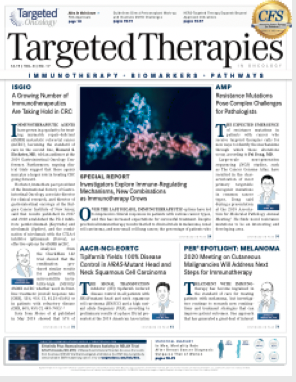A Growing Number of Immunotherapeutics Are Taking Hold in CRC
Immotherapuetic agents have grown in popularity for treating mismatch repair–deficient (dMMR) metastatic colorectal cancer, becoming the standard of care in the second line, <strong>Howard Hochster, MD</strong>, told an audience at the 2019 Gastrointestinal Oncology Conference. Furthermore, ongoing clinical trials suggest that these agents may play a larger role in treating CRC going forward.
Howard Hochster, MD

Howard Hochster, MD
Immotherapuetic agents have grown in popularity for treating mismatch repairdeficient (dMMR) metastatic colorectal cancer (mCRC), becoming the standard of care in the second line,Howard Hochster, MD, told an audience at the 2019 Gastrointestinal Oncology Conference. Furthermore, ongoing clinical trials suggest that these agents may play a larger role in treating CRC going forward.
Hochster, immediate past president of the International Society of Gastrointestinal Oncology, associate director for clinical research, and director of gastrointestinal oncology at the Rutgers Cancer Institute of New Jersey, said that results published in 2017 and 2018 established the PD-1 inhibitors pembrolizumab (Keytruda) and nivolumab (Opdivo), and the combination of nivolumab with the CTLA- 4 inhibitor ipilimumab (Yervoy), as effective options for dMMR mCRC.
Analyses from the CheckMate 142 trial showed that the combi- nation produced similar results for patients with microsatellite instabilityhigh (MSI- H)/dMMR mCRC treatment (overall response rate [ORR], 55%; 95% CI, 45.2%-63.8%) or in patients with refractory disease (ORR, 60%; 95% CI, 44%-74%).1,2
Data from Morse et al published in May 2019 showed that 57% of treatment-emergent adverse events for patients taking nivolumab/ipilimumab were of grades 1/2 and appeared relatively early in treatment.3
“In terms of the toxicity for nivolumab plus ipilimumab, there have been data by organ system, and you can see that it’s mostly in the first 3 monthsonce you make it past 3 months, you don’t have too much toxicity—and it’s mostly cutaneous,” Hochster said.
In addition to ongoing trials exploring pembrolizumab in this patient population, investigators have moved on to evaluating other immunotherapy agents, such as the antiPD-1 monoclonal antibody atezolizumab (Tecentriq) and the anti–PD-L1 monoclonal antibody avelumab (Bavencio).
In the 3-arm COMMIT trial (NCT02997228), investigators are comparing atezolizumab alone versus a modified FOLFOX regimen (folinic acid, fluorouracil, and oxaliplatin; mFOLFOX) plus bevacizumab (Avastin) with or without atezolizumab for patients with MSI-H mCRC in the frontline setting. Investigators in the ATOMIC trial (NCT02912559) will compare mFOLFOX plus 25 cycles of atezolizumab versus mFOLFOX alone for patients with stage III dMMR CRC in the adjuvant setting.
In the POLEM trial (NCT03827044), patients who have undergone radical surgical resection for stage III dMMR orPOLEexonuclease domainmutant colon cancer will be assigned to chemotherapy with CAPOX (capecitabine and oxaliplatin) chemotherapy for 12 weeks, capecitabine for 24 weeks, or chemotherapy followed by avelumab for 24 weeks.
Novel Checkpoint Combinations
Investigators have had success combining a PD-1 inhibitor with a CTLA-4 inhibitor in a range of solid tumors, including mCRC with nivolumab and ipilimumab. Now investigators are researching the safety and efficacy of other agents that inhibit the same checkpoints, hoping to find similar success.
Findings from the phase II CCTG CO.26 study presented at the 2019 American Society of Clinical Oncology Annual Meeting showed that the combination of the antiPD-L1 antibody durvalumab (Imfinzi) and the anti–CTLA-4 antibody tremelimumab extended median overall survival (OS) by 2.5 months compared with best supportive care alone in patients with microsatellite stable (MSS), refractory advanced CRC (6.6 vs 4.1 months; HR, 0.72; 95% CI, 0.54-0.97;P= .07).4
Hochster noted that the combination seemed to have a more significant effect on median OS compared with best supportive care in patients with a high tumor mutation burden (TMB) ≥28 mutations/Mega- base (5.5 vs 3.0 months; HR, 0.34; 90% CI, 0.18-0.96;P= .004) rather than those with a TMB <28 mutations Megabase (6.9 vs 5.3 months; HR, 0.76; 90% CI, 0.53-1.09;P =.21).
“Compared with best supportive care, for high TMB there does seem to be a difference, but the overall survival, if [TMB]
is less than 28%, which was about 3% of the population, is quite low,” Hochster said. “There might be a few MSS patients who have high TMBs for other uncharacterized mutations who will benefit from anti PD-1–based therapy.”
Regorafenib (Stivarga), an oral multikinase inhibitor, is indicated for the treatment of patients with mCRC who have been previously treated with fluoropyrimidine-, oxaliplatin-, and irinotecan-based chemotherapy, an anti-VEGF therapy, and, ifRASwild-type, an anti-EGFR therapy. However, response rates are low in mCRC; a retrospective study of 702 patients found an ORR of just 2% (95% CI, 0.8%- 3.2%) with regorafenib monotherapy.5 Similarly, single-agent nivolumab (31%) has demonstrated an ORR lower than that of pembrolizumab (53%) or nivolumab/ipilimumab (55%).
Using the 2 agents together, Hochster said, was an example of combining inactive drugs and hoping they become active.
In the single-arm, phase Ib REGONIVO trial, 2 cohorts comprising 50 total patients with previously treated advanced or metastatic gastric cancer or CRC were assigned to regorafenib/nivolumab. Nine- ty-eight percent of patients had MSS dis- ease, 59% had negative PD-L1 expression, and 14% had received prior treatment with an antiPD-1/PD-L1 inhibitor(s).6
The ORR was 36% in all patients in the CRC arm and 33% in MSS patients with CRC.
“This looks pretty impressive, and 1 particular reason may be that regorafenib is a pretty ‘dirty’ kinase and does seem to hit both VEGFR2 and CSF1R, which is important for Tregs [regulatory T cells],” Hochster said. “Biopsy data show that the percentage of Tregs within the tumor-infiltrating lymphocytes goes down with regorafenib. That may reverse some of the resistance to the antiPD-1 drugs.... I think we’re all really interested in seeing what happens.”
Following the results of the phase Ib trial, a phase III trial is being initiated to evaluate regorafenib plus nivolumab in patients with MSS mCRC in comparison with regorafenib alone.
References
- Overman MJ, Lonardi S, Wong KYM, et al. Durable clinical benefit with nivolumab plus ipilimumab in DNA mismatch repair-deficient/mi- crosatellite instability-high metastatic colorectal cancer. J Clin Oncol. 2018;36(8):773-779. doi: 10.1200/JCO.2017.76.9901.
- Lenz HJ, van Cutsem E, Limon ML, et al. Durable clinical benefit with nivolumab (NIVO) plus low-dose ipilimumab (IPI) as first-line therapy in microsatellite instability-high/mismatch repair deficient (MSI-H/dMMR) metastatic colorectal cancer (mCRC). Presented at: European Society for Medical Oncology 2018 Congress; October 19-23, 2018; Munich, Germa- ny. Abstract LBA18_PR.
- Morse MA, Overman MJ, Hartman L, et al. Safety of nivolumab plus low-dose ipilimumab in previously treated microsatellite instability-high/ mismatch repair-deficient metastatic colorectal cancer [published online May 30, 2019]. Oncologist. doi: 10.1634/theoncologist.2019-0129.
- Chen EX, Jonker DJ, Loree JM, et al. CCTG CO.26: Updated analysis and impact of plasma-detected microsatellite stability (MSS) and tumor mutation burden (TMB) in a phase II trial of durvalumab (D) plus tremeli- mumab (T) and best supportive care (BSC) versus BSC alone in patients (pts) with refractory metastatic colorectal carcinoma (rmCRC). J Clin On- col. 2019;37(suppl 15; abstr 3512). doi: 10.1200/JCO.2019.37.15_sup- pl.3512.
- Mercier J, Voutsadakis IA. A systematic review and meta-analysis of retrospective series of regorafenib for treatment of metastatic colorectal cancer. Anticancer Res. 2017;37(11):5925-5934. doi: 10.21873/antican- res.12039.
- Fukuoka S, Hara H, Takahashi N, et al. Regorafenib plus nivolumab in patients with advanced gastric (GC) or colorectal cancer (CRC): an open-label, dose-finding, and dose-expansion phase 1b trial (REGONIVO, EPOC1603). J Clin Oncol. 2019;37(15 suppl; abstr 2522). doi: 10.1200/ JCO.2019.37.15_suppl.2522.
